Katrina,
1 year later - Heroes of Mariah
Searching for the Face of Katrina and a Sign
of Hope
To a reporter covering the aftermath, a girl
named Justice became a symbol of the suffering. Where was she? In a place
that felt like home?
By Scott Gold, Times Staff Writer
August 28, 2006
New Orleans The first time I met Justice, she
was in the Louisiana Superdome, sitting sidesaddle on her mother's lap
and swinging her legs as if she were on a shady porch, not trapped in a
defeated city.
At the time, two days after Hurricane Katrina
struck, she was 17 months old, the same age as my daughter. I wrote about
her that night, how she was eating trail mix rescuers had handed out, how
I had foolishly advised her mother when there was nothing else to eat
that babies shouldn't eat raisins.
She became, to me, the face of the storm, the
face I saw when I thought about everything the Gulf Coast had endured in
those terrible months: the decimation of 93,000 square miles, the dead
and the displaced, the unmasking of a forgotten American underclass. Did
her family, like many who endured the hurricane, still live with a quiet
sadness? Where had they ended up? Wherever it was, did it feel like home?
As the first anniversary of the storm approached, I decided to find out.
There are suggestions of progress and recovery
here. Billions of dollars in federal aid is headed toward the region. Some
have suggested that New Orleans, long one of the poorest cities in America,
could become a boomtown. But it's easy to be pessimistic about its future.
Block after block remains abandoned. Crime is
up. Suicides have tripled. City Hall where the facade is still missing
some of the letters in "City Hall" announced recently that the anniversary
of Katrina would be marked with comedy and fireworks. But there is a pervasive
sense that the party is over, and amid public outcry, a more somber memorial
has been planned.
Maybe, I thought, finding Justice would provide
some hope.
The operator at the Federal Emergency Management
Agency was reading from a script: "What state did your disaster occur in?"
I told her that it was wasn't exactly my disaster but that it had occurred
in Louisiana, that I was trying to locate a family I had last seen in the
Superdome.
She suggested calling the Louisiana Family Assistance
Center and the National Next of Kin Registry.
The center said it would need an address, phone
number and date of birth, which, I pointed out, if I'd had, I wouldn't
have had to call in the first place.
The registry operator said: "I can't even tell
you where to start."
Next was City Hall in New Orleans. The operator
offered a number for the Red Cross; it was a fax line. I called back to
City Hall.
"Have you tried FEMA?"
The only concrete leads were on a list of addresses
compiled from voting and property records where Justice's family may
have lived before the storm. The first stop was a house in the working-class
Bywater district. One of Justice's relatives appeared to have lived in
this "double," a fatter version of the city's narrow shotgun homes.
Azaleas had taken over, and weeds had erupted
through the concrete steps leading to the door. There was no one home,
hardly unusual in a city where fewer than half the residents have returned.
Across the bridge that spans the nearby Industrial
Canal, a scrawny man was wrestling the radiator out of a green pickup on
the roadside. The truck had been struck by a tidal surge that had ripped
off its roof. But in New Orleans, where scavengers pick through the rubble
every day, it was a find. His hands coated in rust, sweat dripping from
his nose, Tyrone Smith said the radiator might fetch $15 or more at the
scrap yard.
Smith put in 13 years at a shrimp plant before
the storm a job that vanished amid a crumbling economy. Now he gets $10
an hour rewiring flooded houses. The 42-year-old lives in a gutted house
in the 9th Ward, and sleeps in a bunk bed next to exposed studs pocked
with rusty nails.
A pickup truck rumbled down the street. It was
a noisy arrival; clamshells swept in from the Gulf of Mexico still covered
many of the streets. "The bossman!" Smith said. He raced off to retrieve
the kneepads his boss had given him for work. Then he ran toward the truck,
pausing only when he spotted a twisted piece of aluminum lying in the weeds.
It was enough, he said, to get a couple bucks at the scrap yard.
House after house was vacant. No one remembered
Justice or her family.
Next to one of the houses in the Bywater, neighbor
Dymous Henry said seven people were living on the block of 21 dwellings.
Even those who have returned, he said, are not really home.
"People here can't take change," said Henry, 48.
"There were people who lived in this part of town who had never been Uptown,
never been across the river. This has done something to them. Everybody's
changed."
In the Gentilly neighborhood, close to Lake Pontchartrain,
was a house where Justice's mother, Tonisha, may have lived in 2002. Now,
a meaty tree limb juts through the roof. The block is so quiet you can
hear the warped houses wheeze as they settle.
Across the street were the block's only residents.
Renee Daw, 43, who works at a shipping warehouse, and her son, Raynau,
8, rode out the storm at home. When they were chased from the attic because
the water got so high, they kicked out a vent and climbed onto the roof.
They were rescued after three days. They returned in April, and live in
a FEMA trailer parked in front of their gutted house.
New Orleans is not an easy place to be a kid these
days. There are two boys Raynau's age three blocks away. They came by to
play, once. The local park is padlocked; the bleachers next to the baseball
diamond are upside-down. Asked what he was going to do with the rest of
his day, Raynau just shrugged.
"We mostly just stay in the trailer," Daw said.
"We're inside people now."
Raynau misses the black Labrador he had to leave
behind when he and his mother were rescued. Other than that, he never brings
up the storm, even though they still boil water to brush their teeth, even
though a lifejacket, a remnant of the rescue, still dangles from the rafters
of the attic.
"He's let it go," Daw said. "Just like his mama."
In Pontchartrain Park, a neighborhood of postal
workers and schoolteachers that was devastated by a breach in the London
Avenue Canal, property records indicated that Tonisha's mother, Winifred
Jones, owned a tiny home. Today, the door is missing. There is nothing
inside but a toilet and a bathtub full of chunks of drywall.
Down the street, a man living in a FEMA trailer
was mowing a neighbor's lawn, not because he had any neighbors, but because
snakes and other critters had taken up in the overgrown lots.
"Tonisha?" he said. "That's my goddaughter!"
This was Winifred Jones' house, he confirmed.
But when asked where they were living, he snapped: "Why are you asking
me all these questions?"
He began to sweat profusely. He grabbed the sides
of his baseball cap, pulled it low and retreated into the street, stumbling
over a pile of empty bleach bottles, tree limbs and splintered boards.
"Do you know them?" he shouted. "Or don't you?"
It was a valid question; despite the connection
that I felt with Justice and her mother, I didn't really know them at all.
"I don't mean any harm. I'm just trying to see if they're OK."
"Don't you get it, boy?" he screamed. "Everybody's
gone! Everybody's lost!"
Twenty-two houses, in Gentilly, in Pontchartrain
Park, in the Bywater. Nothing. Fifty-three phone calls, to FEMA, to City
Hall, to disconnected numbers, and to people in North Carolina and Oklahoma
who appeared to be relatives or old neighbors, but none knew Justice and
the family.
Where were they?
An Internet message board set up to reunite storm
victims provided a clue I had missed: a note from Winifred Jones written
from the Houston Astrodome, which after Katrina had served as a shelter.
It included a cellphone number.
A recording said the phone network would not accept
messages. Another dead end, it seemed. But a few minutes later, my phone
rang. A woman was on the other end: "Who called this number?"
"I'm trying to find Tonisha Jones," I said.
"I'm her auntie," she said. She said they were
living in Beaumont, Texas. "I'll have her call you in 15 minutes."
When the phone rang, I raced across the room to
answer it. I said I was looking for a little girl named Justice.
"That's my baby," Tonisha said. "I remember you."
The next morning, Justice was on the second-floor
balcony of a tidy apartment complex on the west side of Beaumont, swinging
around her mother's leg, a smile on her face, her red gingham dress billowing
behind her.
There were suggestions of home. A scooter was
outside the apartment and, inside, a chicken was baking in the oven. Justice's
father, Joshua Lonzo, was tying on an apron getting ready to go to work
at a grocery store.
But like half a million evacuees who remain scattered
across the country, Justice's family is still unsettled. Nothing feels
familiar. They are still learning their way around the area. The stores
don't carry the Cajun spices they had cooked with, or the white Bunny Bread
they had used for sandwiches. Dinner is eaten on donated plates, in front
of a donated TV.
Tonisha and Joshua Lonzo she has recently taken
his last name were products of the New Orleans projects. Gangs ruled.
Drugs were everywhere. As a boy, Josh watched more than one man get shot
in the head. Only God, he says, knows how he and Tonisha chose the straight
path.
They met at a party when they were 15. They lived
across the railroad tracks from each other and went to different high schools
but saw each other every day. Their friends joked that they had turned
into an old married couple before their senior prom.
Four years ago, they had their first daughter,
Taylor. They married a short time later. Tonisha worked as a cashier at
a drugstore. Josh was a cook on a riverboat and drove a truck for an upholstery
company.
"We were poor," said Tonisha, 25. "But we were
making it."
They rented a little clapboard house in the 7th
Ward. They bought a bedroom set on layaway. They went into the French Quarter
for an occasional daiquiri and stopped by her grandmother's house on weekends
for a slice of coconut pie.
On the day the storm came, they gave no thought
to leaving the city, like tens of thousands of others. Generations of their
family had stayed and ridden out storms and, in any case, they had little
money and nowhere to go.
They went to the Superdome better prepared than
most. They had crackers, sardines, smoked sausage. They had three changes
of clothes for the girls and 25 diapers for Justice.
By the time they got out six days later, everything
that had not been lost or stolen a couple of boxed meals, some medicine,
keys to a Dodge Intrepid they would never see again fit into a child's
suitcase decorated with the Cat in the Hat. The girls were covered in mud
and urine. They had lost their shoes, so Tonisha had made them new ones,
first by tying plastic bags around their feet, then by tearing strips of
fabric from a pair of pants someone gave her.
When a military helicopter flew them to Louis
Armstrong New Orleans International Airport, Tonisha saw the flooded city.
"I looked one way water. I looked the other way water. I couldn't believe
my eyes," she said. "We had no idea what had happened."
The next day, a Navy plane flew them to Corpus
Christi, Texas. After three weeks at a shelter, Tonisha got in touch with
her aunt, Galintha Harden, who had also ended up in Texas. Her aunt told
her about an apartment in Beaumont that a church had found for another
relative, so Tonisha, Josh and the girls took a bus there.
Days after their arrival, Hurricane Rita slammed
into the city. "The double whammy," Tonisha said. They fled again, 11 relatives
in two cars. They stayed in a hotel in Lafayette, La., for two weeks.
Those were dark days. They were exhausted. Tonisha
could not shake the putrid smell of the Superdome.
"I was crazy," she said. "I just kept smelling
it, no matter how much we washed. I would sit and cry, cry, cry. Eventually,
I realized that I had to stay strong for my kids. I realized that it could
have been worse, because we were alive."
In October, Tonisha, Josh, the girls and three
other relatives moved into the $550-a-month two-bedroom apartment in Beaumont.
By then, Tonisha had discovered she was three months pregnant.
It was not an easy pregnancy; doctors hospitalized
her for two months because her amniotic fluid was too low and her blood
pressure too high. Josh had found work as an automotive technician. But
juggling the girls' care and his job proved too much. After he was late
to work a couple of times even after bringing a note from Tonisha's doctor
explaining that she was in the hospital he was fired.
They were so strapped for money that at one point
they borrowed a car and drove 260 miles to New Orleans to recover $240
in cash that Tonisha remembered she had left in the pocket of Josh's jeans.
The money was with the electric bill that Josh was supposed to have dropped
off that week.
Looters had already been inside their house but
had missed the envelope. Tonisha washed the mold off each bill with soap
and water.
While there, they salvaged what they could.
Some of Josh's trading cards survived, including
an autographed Brett Favre football card he had wrapped in plastic. Tonisha
recovered a bag of photos that had been on top of a bookshelf. Inside was
the only record of their old life photos of prom night, he in a tux and
she in a silver gown, and of Taylor at her first birthday party, a handful
of dollar bills pinned to her shirt in a New Orleans tradition.
They miss New Orleans the pickled meat and the
gumbo, the raucous parades held by the Zulu Social Aid and Pleasure Club.
"But it's peaceful here," Tonisha said one recent afternoon, as her girls
ran through the courtyard of their apartment complex and pretended to make
spaghetti with a pile of twigs.
Justice is a typical toddler, "always looking
for trouble," Tonisha said. She gets mad when told she cannot store her
toys in the microwave. She is scared of bugs and loud noises. She uses
a broomstick to flip on the lights. She is too little to remember the storm,
or New Orleans. Tonisha figures that's for the best.
Zoey, the baby, was born in April. She sleeps
between Tonisha and Josh. Justice and Taylor sleep in a single bed on the
other side of a nightstand crowded with sippy cups, toys and the Bible
that Tonisha and Josh recently bought to replace the one they lost in the
flood.
Earlier this month, 10 months after Tonisha applied,
FEMA gave them $10,000 to cover the contents of their house. They have
received a bit of additional aid, from the Red Cross and from a local church.
They have no health insurance; the children are covered through Medicaid.
Josh, 24, has a new job working at the deli of a grocery store. He makes
$7.80 an hour. The three paychecks that come into the apartment are pooled;
they total about $700 a week, which pays for rent, bills and food for eight,
but not much more.
On July 4, Tonisha's aunt was driving the car
they all shared when she was rear-ended by a woman with no insurance. The
girls' car seats had been stored in the trunk, which was so badly damaged
they couldn't get in to retrieve them.
Tonisha and Josh needed a car of their own. Josh
found an ad asking $4,500 for a 1997 Chevrolet Suburban. It was big enough
for all of them, but the purchase would sap about a third of their net
worth and the car had nearly 200,000 miles on it.
Tonisha and Josh borrowed her aunt's crumpled
car and drove to the seller's house in a middle-class neighborhood. Josh
hopped out to take a look. "What do you think?" he asked when he came back.
"It's up to you," Tonisha told him.
Josh took the Suburban for a spin. The seller
told him that it had a new transmission and air conditioner. Josh paid,
in cash, and drove it home.
"I just hope it lasts," Tonisha said as she pulled
out behind him.
Justice had been in the car for a while, and was
getting antsy. Without the car seats, she and Taylor were not strapped
in: Taylor was sitting on top of a case of bottled water, and Justice scooted
over to the window to peer out.
"Justice!" Tonisha yelled. "Get away from the
door! You want to get hurt?" Justice slouched in the back seat and pouted.
Tonisha fiddled with the radio, trying to distract her so she wouldn't
cry. "Justice!" she called. "It's your song!"
It was Mariah Carey's "Fly Like a Bird." The song
is a prayer for strength: "Don't let the world break me tonight
. I pray
you'll come and carry me home." Justice bobbed her head to the beat, her
braids swaying back and forth. Then she put her head on my shoulder and
her hand on my arm. Soon, she was asleep.
I stared out the window, thinking about the storm,
about everything I'd seen in the last year, about how silly it had been
to think that a 2-year-old would be able to provide me with a happy ending.
--------------------------------------------------------------------------------
Gold has covered Hurricanes Katrina and Rita
and their aftermaths for the last year.
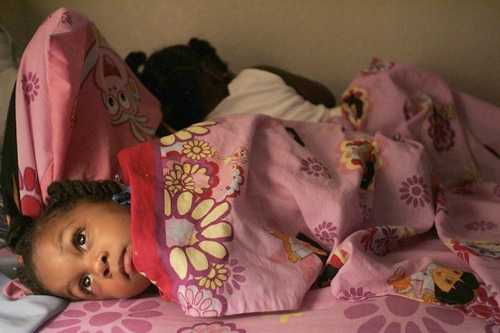
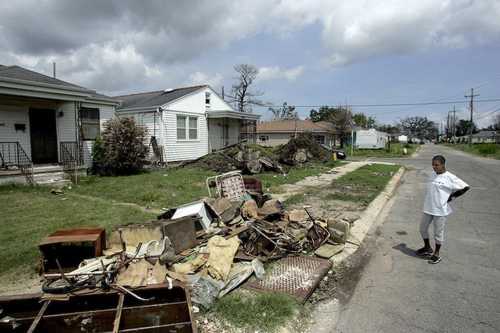
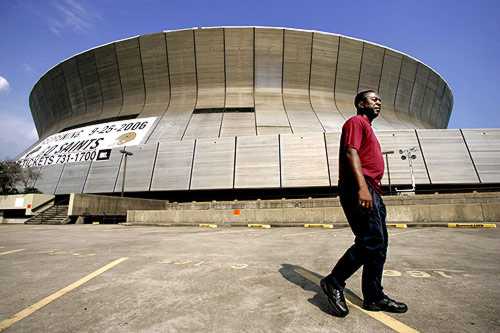
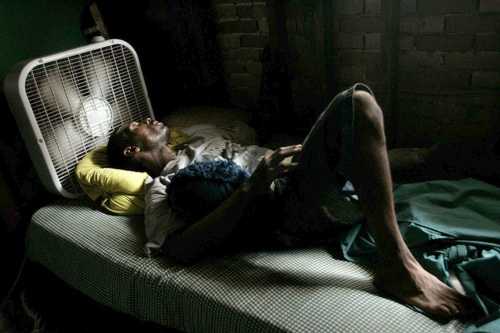
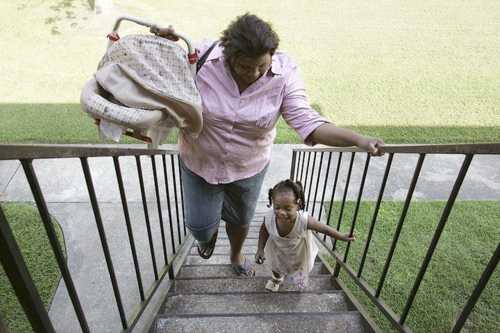
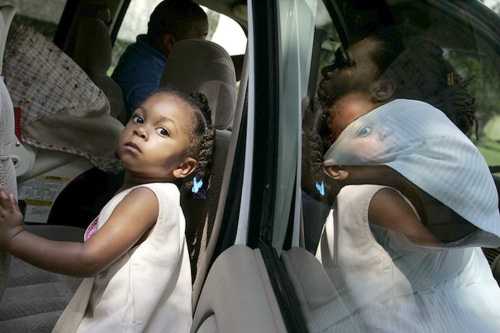
Click to enlarge.
Pic 1: A new start: Justice
Lonzo, 2, lies next to her older sister in a two-bedroom apartment in Beaumont,
Texas, where they live with their parents, a baby sister and three other
relatives.
Pic 2: "We're inside people
now": Renee Daw, 43, looks at debris left near her home in New Orleans'
Gentilly
neighborhood. She and her 8-year-old son, who
have lived in a FEMA trailer in front of their damaged house since April,
are the only residents on their block. "We mostly just stay in the trailer,"
she says.
Pic 3: "Everybody's changed":
Dymous Henry, 48, walks in front of the Superdome in New Orleans. He says
that even people who have returned to his neighborhood are not really home.
"This has done something to them," he says.
Pic 4: Life after the storm:
Tyrone Smith, 42, rests inside a gutted house in the 9th Ward. Before Hurricane
Katrina, he
worked at a shrimp plant; now he gets $10 an
hour rewiring flooded homes.
Pic 5: Homesick: Tonisha
Lonzo, 25, and Justice walk up to their Texas apartment. The Lonzos still
feel unsettled a year after Katrina uprooted them from their New Orleans
home. They eat dinner on donated plates, in front of a donated TV.
Pic 6: Face of Katrina:
Justice Lonzo, 2, gets into the family car to pick up her sister from school.
Reporter Scott Gold met Justice at the Superdome in Katrina's aftermath
when she was 17 months old.
Source: KTLA
(All rights reserved)
Posted on August the 29th. 2006
Copyrights and all rights are reserved to the owner of the rights.
Site owner: Gilles Ollevier
Heroes of Mariah 2000
E-mail: staff@heroesofmariah.com
Index





